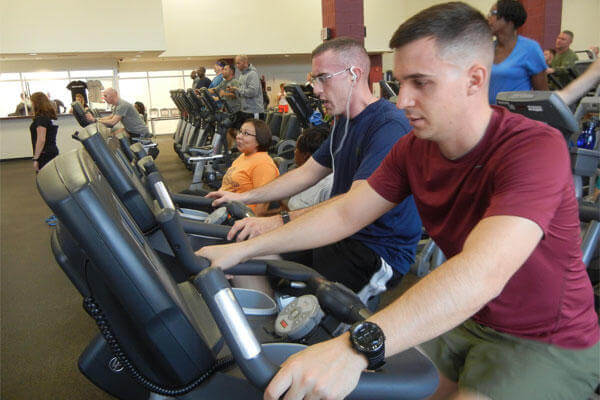MARINE CORPS BASE QUANTICO, Va. -- For three days next week, a team of health professionals, lead by the Office of the Secretary of Defense, will roam Marine Corps Base Quantico investigating the practices of the schools, clinics, commissary, family services, chow halls, youth centers and other services to see how they’re promoting healthy living for Marines, sailors and their families. They’ll question military spouses, all ranks of service members and program managers.
“This is not an inspection— it’s not a test,” said Mary Hicks, director of Marine Corps Community Services for the base.
Quantico was one of two Marine Corps bases selected to participate in the year-long Healthy Base initiative, which seeks to catalogue the smartest practices being implemented to fight obesity and tobacco use and generally promote health among military families across the Department of Defense. A total of 13 DOD installations are participating in the initiative, which is billed as a demonstration project for Operation Live Well, which is itself part of the president’s National Prevention Strategy to foster healthy living for all Americans.
Prevention is being emphasized because, as the program’s literature points out, 96 percent of the money spent on health care in the United States goes to treatment of existing health problems, while only 4 percent goes to preventing them in the first place.
Operation Live Well aims to make it easy and normal across the Department of Defense to lead a healthy lifestyle, helping the military to serve as a model of a way of life that prevents health problems, Hicks explained.
Quantico was chosen in part because the base has so many health and wellness programs to model and in part simply because one goal of the initiative is to include different types of bases in different environments, and Quantico has a profile that adds to that variety, she said. MCCS is taking the lead as far as assisting the team that will carry out the assessments from July 23 to 25 because it’s at the center of so many of the base’s fitness programs.
“What they’re basically trying to do is cull best practices and then share those across the DOD,” Hicks said.
Michelle Vukovich, Quantico’s director of Semper Fit and recreation for MCCS, spent most of last week conducting these same assessments as part of the HBI team that visited Marine Corps Air Ground Combat Center Twentynine Palms, Calif. She was one of three members of the subgroup that focused on health and wellness. As they do at every participating base, a total of six of these subgroups each examined an area of focus. These also included physical activity, tobacco use, children’s health, food options and physical environment.
“Twentynine Palms, from my perspective, already had good practices in place, but does everyone think there’s always room for improvement? Of course,” Vukovich said.
She noted that 10 percent of the defense budget is spent on health care, with much of that expenditure stemming from obesity and tobacco use. While active duty Marines generally don’t have obesity issues, they do smoke, and they also may lose their healthy habits after leaving the service.
“Where the problem lies in the future is with our retired population,” she said. “How do we create a culture so that when you retire from the armed services you want to continue with a healthy lifestyle?”
Meanwhile, service members’ families tend to have the same health issues as the population at large. This cuts not only into the budget, but also into future recruiting. Twenty-seven percent of potential military candidates can’t meet the weight qualifications to join, and Vukovich noted that many Marines are recruited from families that are in the service.
This is one reason children are a focus of the study. Another is that they’re impressionable.
“Practices we adopt when we’re young are practices we carry over when we’re older into our retirement years,” she said.
About two months after each base’s assessment, the team will return to deliver a brief, identifying the installation’s best practices and some approaches they’ve discovered elsewhere that the base could put to use, Vukovitch said. They’ll also come up with ways to measure the success of these efforts, and about a year later, they’ll return to measure their success. It’s a way of testing the best practices they identify.
However, Hicks cautioned, “Along with this comes no money.” Implementing new practices “is going to be a challenge based on the budget challenges we have right now.”
But she said she welcomes the opportunity to improve. “We’re always trying to refine and do better.”
“It’s an opportunity to showcase what we do well and be open to programs that would improve what we already do,” said Vukovich.



























